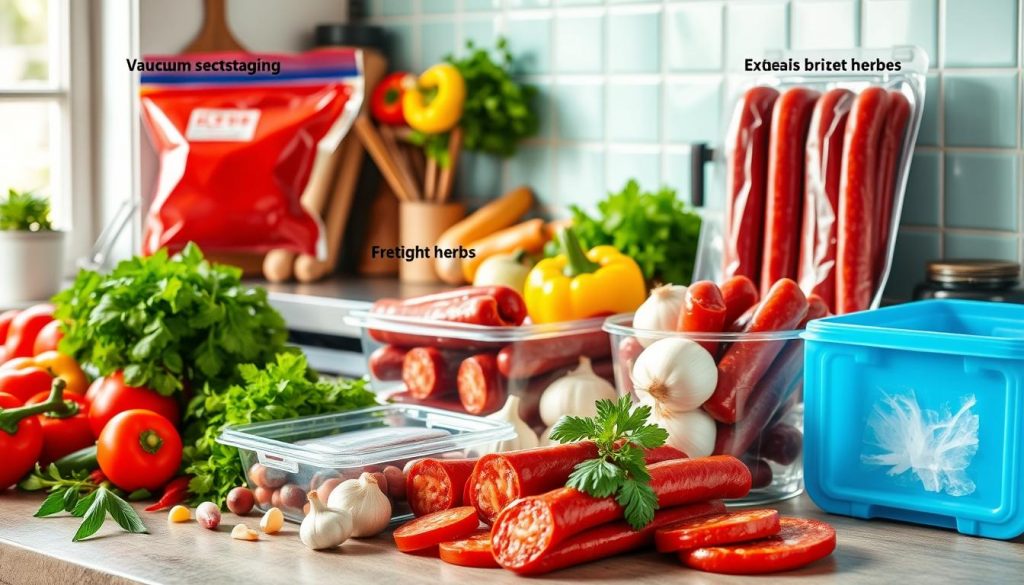Storing cooked chorizo can be tricky. This guide will help you keep your chorizo fresh and safe to eat. We’ll cover essential aspects of preserving this flavorful sausage.
Proper storage is crucial for chorizo lovers. We’ll explore optimal refrigeration methods and spoilage signs. This ensures you can enjoy your chorizo longer without compromising taste or safety.
Key Takeaways
- Learn proper cooked chorizo storage methods
- Understand factors affecting chorizo shelf life
- Discover signs of spoiled chorizo
- Explore freezing and thawing techniques
- Master safe reheating practices
- Avoid common storage mistakes
Understanding Chorizo: Types and Characteristics
Chorizo is a tasty sausage that comes in many types. Each type has its own unique features. Let’s explore the world of chorizo and its varieties.
Mexican vs. Spanish Chorizo Differences
Mexican and Spanish chorizos are two main types with big differences. Mexican chorizo is fresh and uncooked. Spanish chorizo is cured and ready to eat.
The flavors and textures are very different between these two types. Mexican is soft, while Spanish is firm.
| Characteristic | Mexican Chorizo | Spanish Chorizo |
|---|---|---|
| Texture | Soft, crumbly | Firm, sliceable |
| Cooking method | Requires cooking | Pre-cooked, can be eaten as-is |
| Main spices | Chili peppers, vinegar | Smoked paprika, garlic |
Common Ingredients in Chorizo
Chorizo ingredients change based on type and region. Some common items include:
- Pork
- Paprika
- Garlic
- Salt
- Vinegar (for Mexican chorizo)
Preparation Methods and Cooking Styles
Chorizo prep differs by type. Spanish chorizo is often sliced and eaten as-is. It can also be added to dishes for flavor.
Mexican chorizo is taken out of its casing and cooked before eating. People like to grill, fry, or add it to stews and paellas.
“The versatility of chorizo makes it a beloved ingredient in many cuisines, from simple tapas to complex main courses.”
How Long Does Cooked Chorizo Last in the Fridge
Properly stored cooked chorizo can last in the fridge for 3 to 4 days. This flavorful sausage’s safe storage time is crucial for food enthusiasts. We’ve researched to help you enjoy it at its best.
The chorizo expiration timeline depends on several factors. These include initial freshness, cooking method, and storage conditions. To maximize shelf life, store cooked chorizo in airtight containers or wrap it tightly.
The safe storage time starts from the moment chorizo is prepared. For pre-cooked chorizo, refer to the package’s “use by” date. Trust your senses – discard chorizo if it smells off or shows mold signs.
| Storage Method | Safe Storage Time | Temperature |
|---|---|---|
| Refrigerator | 3-4 days | 40°F (4°C) or below |
| Freezer | 1-2 months | 0°F (-18°C) or below |
Freezing is an excellent option for longer-term storage. Frozen cooked chorizo can maintain its quality for up to 2 months. Thaw it in the refrigerator when ready to use.
For the best taste and texture, consume thawed chorizo within 24 hours. This ensures you enjoy the sausage at its finest.
Proper Storage Techniques for Cooked Chorizo
Storing cooked chorizo right keeps it tasty and safe. Let’s look at ways to keep your favorite sausage fresh and delicious.
Airtight Container Guidelines
Use airtight containers to keep chorizo fresh. Pick containers with tight-fitting lids to block air. Glass or BPA-free plastic containers work great.
Cool the chorizo fully before storing. This stops moisture from building up inside the container.
Temperature Control Importance
Fridge temperature is key for chorizo storage. Keep your fridge between 35°F and 40°F (1.7°C to 4.4°C). This slows down bacteria growth.
Store the container in the main fridge area. Avoid the door, where temperatures change more often.
Best Storage Practices
Wrap cooked chorizo in foil or plastic before putting it in a container. This extra layer helps if you freeze it later. Label the container with the date.
| Storage Method | Maximum Storage Time | Temperature |
|---|---|---|
| Refrigerator | 3-4 days | 35°F – 40°F |
| Freezer | 2-3 months | 0°F or below |
These tips keep your cooked chorizo fresh and safe. Always check for signs of spoilage before eating stored chorizo.
Signs of Spoiled Chorizo
Knowing how to spot bad chorizo is key for safe eating. We’ll show you what to look for in color, smell, and texture. These signs will tell you if your chorizo has gone bad.
Look at the color first. Fresh chorizo should be bright red. If you see green or grey spots, throw it away. Mold is also a clear sign of spoiled chorizo.
Use your nose to check freshness. Good chorizo smells spicy and nice. If it smells sour or odd, it’s best to toss it out.
Feel the texture of the chorizo. It should be firm when fresh. If it’s slimy, sticky, or too soft, bacteria may have grown on it.
| Indicator | Fresh Chorizo | Spoiled Chorizo |
|---|---|---|
| Color | Vibrant red | Discolored, green or grey patches |
| Smell | Spicy, pleasant aroma | Sour, rancid, off-putting |
| Texture | Firm | Slimy, sticky, or unusually soft |
If you’re not sure, it’s safer to throw it out. Your health is more important than eating bad food. Stay alert and check for these signs to enjoy chorizo safely.
Freezing Cooked Chorizo: A Complete Guide
Freezing chorizo extends its shelf life. Learn how to freeze chorizo and enjoy your sausage for longer. This guide will help you make the most of your tasty chorizo.
Preparation for Freezing
Cool chorizo completely before freezing. Cut it into smaller portions for easy thawing. Wrap each piece tightly in plastic wrap or foil.
Place wrapped chorizo in freezer bags. Remove as much air as possible from the bags before sealing.
Recommended Freezing Duration
Proper storage keeps chorizo fresh for months. Here’s a quick guide:
| Chorizo Type | Freezer Storage Time |
|---|---|
| Cooked Chorizo | 2-3 months |
| Raw Chorizo | 1-2 months |
| Cured Chorizo | 3-4 months |
Thawing Methods and Safety
Thaw chorizo safely in the fridge overnight. For quicker thawing, use cold water. Change the water every 30 minutes.
Avoid thawing at room temperature. This prevents bacterial growth and keeps your chorizo safe to eat.
“Always prioritize food safety when handling frozen meats. Proper thawing ensures both taste and health aren’t compromised.”
Follow these tips to master chorizo freezing. You’ll enjoy its delicious flavors for months to come. Freezing chorizo is easy with this guide.
Reheating Stored Chorizo Safely

Proper reheating of chorizo ensures food safety and preserves its flavor. Learn how to safely reheat stored chorizo to keep it tasty. Follow these steps to maintain its texture and taste.
First, let the chorizo sit at room temperature for 15 minutes. This helps it heat evenly. For microwave reheating, place it on a safe plate with a damp paper towel.
Heat in 30-second bursts, checking between each round. On the stovetop, use medium heat with a bit of oil. Cook for 3-5 minutes, stirring now and then.
Always ensure the chorizo reaches 165°F (74°C) internally. Use a food thermometer to check. This temperature kills harmful bacteria and ensures safety.
- Microwave: 30-second intervals, stirring between
- Stovetop: 3-5 minutes over medium heat
- Oven: 10-15 minutes at 350°F (175°C)
Never reheat chorizo more than once. Throw away any leftovers after reheating. This prevents foodborne illnesses. Follow these tips for safe and delicious chorizo every time.
Health and Safety Considerations
Proper chorizo food safety is vital to avoid foodborne illnesses. Let’s explore key guidelines for keeping your chorizo safe and tasty. These tips will help you enjoy this flavorful sausage worry-free.
Food Safety Guidelines
Always wash your hands before and after handling chorizo. Cook it to 160°F (71°C) to kill harmful bacteria. Use a food thermometer to check the temperature accurately.
Cross-contamination Prevention
Use separate cutting boards for raw chorizo and other foods. Clean all surfaces that touch raw chorizo with hot, soapy water. This prevents the spread of harmful bacteria to other foods.
Safe Handling Practices
Store raw chorizo in the fridge at 40°F (4°C) or below. Don’t leave it at room temperature for over 2 hours. When freezing, wrap it tightly to prevent freezer burn.
| Safe Handling Tips | Why It Matters |
|---|---|
| Use clean utensils | Reduces bacteria spread |
| Cook thoroughly | Kills harmful pathogens |
| Refrigerate promptly | Slows bacterial growth |
Following these guidelines ensures safe chorizo handling. Your actions are key to food safety. Enjoy your chorizo with peace of mind!
Tips for Maximizing Chorizo Shelf Life

Keeping chorizo fresh can be tricky. Let’s explore effective preservation techniques for this delicious sausage. These tips will help you enjoy long-lasting chorizo in your cooking.
Portioning is crucial for chorizo storage. Divide cooked chorizo into smaller amounts before storing. This reduces waste and maintains quality when you only need a portion.
Vacuum sealing is a game-changer for chorizo preservation. It removes air, slowing bacterial growth and preserving flavor. This method significantly extends chorizo’s shelf life.
- Use airtight containers or heavy-duty freezer bags
- Label containers with the date of storage
- Store chorizo in the coldest part of your fridge
- Keep raw and cooked chorizo separate to prevent cross-contamination
Consider adding a food-grade oxygen absorber to your storage container. This small packet can greatly extend chorizo freshness. It works by removing oxygen from the environment.
“Proper storage is the secret to long-lasting chorizo. It’s not just about keeping it cold; it’s about creating the right environment.”
Chorizo with higher fat content tends to last longer when stored properly. For long-term storage, choose varieties with more fat. These methods will help preserve chorizo’s rich flavors for weeks.
Common Storage Mistakes to Avoid
Ever found your chorizo spoiled too soon? Let’s explore some storage mistakes that can ruin your sausage. Knowing these pitfalls will help keep your chorizo fresh and tasty longer.
Temperature Fluctuations
Not maintaining a steady temperature is a major chorizo preservation error. Keep your fridge at or below 40°F (4°C). Avoid leaving chorizo out on the counter for long periods.
Rapid temperature changes can cause bacterial growth and spoilage. Always store your chorizo promptly after use.
Packaging Errors
Poor packaging often leads to improper chorizo handling. Store cooked chorizo in airtight containers or tightly sealed bags. This prevents moisture and contaminants from causing spoilage.
Remember, air is not your chorizo’s friend! Proper packaging extends its shelf life significantly.
Handling Mishaps
Always use clean hands and utensils when handling chorizo. Cross-contamination is a real risk to avoid. Use separate cutting boards for raw meats and cooked chorizo.
These simple steps help prevent common storage mistakes. They ensure your chorizo stays safe and delicious to eat.




